




Dog Days of Summer
 |
||||||
 |
|
 |
||||
 |
||||||
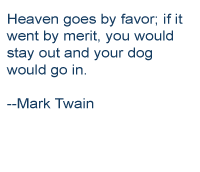


 Volunteer - Click here
Volunteer - Click here
 About our adoption process
About our adoption process
 Visit RatboneRescues.com
Visit RatboneRescues.com


RATTY LEAKS
The quilt team at Ratbone is working to get the 2013 quilt project off the ground. We have patterns ready and have procured the fabrics needed. We will most likely put patterns online and send links to all our volunteers so they can print off what they want to use. The pictures here show an example of a block as it might appear for our quilt, although the fabrics will be different and a sample quilt, with a different theme, to show what the design is like.
The next step will be getting the blocks pieced together. Those who sign up to do piecing will receive several pieces of fabric to sew together in the manner of their choice. The assembled block will then pass on to another volunteer who will applique a design on it. A volunteer may opt to do both parts of the block if they choose. The blocks will all return to the "quilt wrangler" to be assembled and completed.
In that process, the border will be embellished with names of those forever memorable, "first Ratties" provided by our members and friends. We want the name of YOUR first Rat Terrier (or your most beloved) which will be embroidered on a dog tag shape then appliqued on the quilt border.
To submit the name of your Rat Terrier for inclusion on this quilt, please send an email to quilt@ratbonerescues.com with the words "First Ratty" in the subject line. In the body of the email put the name of your pet. If he had a favorite nickname, add this and if you want, a date of birth or "from-to" years (1996-2012). We will have some space limitations on the information we can include on each "tag" but we will use as much of the submitted info as we can. There is no charge for your pup's name to be on the quilt.
This year we are also introducing "surrogate quilters" for those who don't have the time or the experience to make their own quilt block. For a donation of $25, someone will make a quilt block on your behalf.
We hope you will consider volunteering your time and talent to help in the creation of our 2013 My First Ratty quilt or at least add to the quilt the name of that little dog who first sold you on this wonderful breed.
For our webpage about the quilt, follow this link: http://www.ratbonerescues.com/rbr_quilt_new.php. At the bottom of that page you will find links to pictures of our past quilts and close-ups of some blocks from those quilts. If you would like to participate in the Ratbone Rescues My First Ratty Quilt Project, please send an email to our Quilt Wranglers at quilt@ratbonerescues.com and we'll get you started. Looking forward to working with some of you.

|
Ratbone Rescues P.O. Box 3237 Seminole, FL 33775-3237 |

YOUR DOGS PERCEPTION OF BASIC NEEDS (Part 2)
Click here for part 1 of this article.
ENTERTAINMENT
Dogs originally had important roles to fulfill which helped people survive. In other words, they had jobs. They typically helped hunt for food or they protected families and their animals. Today most dogs aren't asked to fulfill the roles they were initially bred for. We don't ask Shepherds to keep our flock together and safe, we don't send our Terriers out to hunt and we don't need Retrievers to bring back what we kill on the hunt.
Our dogs have retained the characteristics that they were initially bred to exhibit. We need to find ways to channel their energy that fit his new role as just a family companion. Shepherds might very good at playing soccer, Retrievers are naturals for fetch games, and Terriers might enjoy agility.
If you run or bike, consider taking your dog along with you. Just be conscious of their need to rest. Dogs are typically sprinters rather than distance runners. Some dogs are as at home in the water as on land, so swimming is great exercise for them. There are a lot of dogs that will avoid water like the plague. This is true of most Terriers. Walking, unless you really go on a very long walk, well seldom tire a dog, unless you make the walk a mental challenge.
Challenging a dog to use his brain will tire him out. Practicing obedience commands, playing mentally challenging games, such as hide the toy or treat, walking to heel with lots of twists and turns are mental exercises. There are mentally challenging toys such as Kongs, Buster Cubes, and Leo Canine Genius toys for dogs. These toys all involve making your dog figure out how to get the treats from inside of the toys.
Balancing the physical and mental exercises will satisfy your dog's needs. Both are needed. If your dog is bored, he'll make up his own games. If he isn't getting enough physical exercise, his energy will find an outlet, usually at the wrong time or in the wrong way. If you take care of his needs, he'll be relaxed and happy.
Try to look at how your dog views things; it is the leaders' responsibility to provide all the needs of the pack. If any of your dog's basic needs are lacking, then you're not fulfilling your job as leader and he will try to take care of his needs himself. This is usually why problem behaviors occur.
If you do provide for all your dog's needs, he will more likely be calm, relaxed and happy. Given a choice, more than nine out of ten dogs would rather defer to someone else, but if his needs aren't being met, ten out of ten dogs will do things to try and satisfy their basic needs themselves. They think their survival depends on it.
Our dog's needs have to be met everywhere he goes or stays for any length of time. If you want him happily spending time in the back yard, make sure he has food, shelter, safety and entertainment out back. If you don't, don't be surprised if he is trying to come back in or is doing things in the yard you'd rather he didn't do, or possibly trying to escape.
Just remember, Happy Dogs – Happy Families
Submitted by Terry Nickerson, Canine Behavior Therapist and owner of Bark Busters of Brevard. You can reach Terry at 1-977-500-BARK or visit her company's website at www.Barkbusters.com.

Does Your Spring Outing with Rover Include a Hike?
Top 5 Tips for Hiking with Your Dog (Part 1)
Spring is right around the corner, so why not turn that daily walk into an interesting and fun hike? It's no secret that exercise is a necessity for both you and your dog. We often forget that our dogs are pack animals and their origins are rooted in hunting, playing, and roaming all day long with their pack family. If you are already in the habit of walking your four-legged friend, you know that it's a special time for the two of you to bond as well as establish yourself as the leader of your domestic pack. Why not shake up your routine a bit and kick your workout into high gear by taking your best friend for a hike?
Follow these 5 tips and your hikes will surely be a wonderful experience that you'll both enjoy together.
- Know Your Limits (Yours and Your Dog's)
Does your current exercise endeavor consist of walking around the block a couple times? Then you may want to rethink that 10 mile hike you're mapping out. Not only do you need to be able to hike without difficulty, so does your furry companion. Start intensifying your walks by making them longer and include hills if possible so the two of you can build up your stamina. It's also advisable to take your dog to the vet just to ensure that he will be able to accompany you comfortably when you're ready to hike. Dogs are people pleasers and they never want to let on that they are injured or in pain, so they will endure it for as long as they can. - Be Prepared
Once you've determined to go on that hike, whether it's a long or a short trip, make sure you have the following items: Collar and leash - Bring these just as you would when you're going for your regular walks. Proper ID tags - The tags MUST be legible and specify your dog's name and your current contact information. It's also a good idea to have a current photo with you just in case you get separated. First Aid Kit - Human first aid kits can come in handy in the event of a cut or scrape (for either of you). Throw some tweezers in it for easy tick removal. Vet's Phone Number - In the event that something unexpected happens, keep your vet's phone number with you so you can quickly find out how to best take care of your dog. You can never be too careful. Sunscreen - You both need sunscreen and they make sunscreen specifically for dogs. Light-colored noses are very susceptible to sunburns and dogs can get skin cancer just like you. Orange vests - Know whether or not you are taking your hike during a hunting season. Orange vests for you and your dog will make sure you both stand out. Appropriate Dress - When hiking during cooler weather, bring along an extra layer of clothes if your dog tolerates them. For summer hikes, keep a cool, moist scarf or bandana that he can wear to take a bite out of the heat.
About TripsWithPets.com
TripsWithPets.com is the #1 online resource for pet travel. It was named BEST pet travel site by Consumer Reports! TripsWithPets.com offers resources to ensure pets are welcome, happy, and safe when traveling. The website features a directory of pet friendly hotels & accommodations across the U.S. and Canada, airline & car rental pet policies, dog friendly beaches, search by route, pet travel tips, pet travel supplies, along with other pet travel resources.

Histoplasmosis refers to a fungal infection caused by the Histoplasma capsulatum fungus. Dogs usually ingest the fungus when they eat or inhale contaminated soil or bird droppings. The fungus then enters the dog's intestinal tract, where it causes a diseased condition to develop.
Symptoms
The most common symptoms for dogs are lack of appetite, weight loss, depression, and diarrhea with straining. Other potential signs may include:
Coughing
Difficulty breathing (dyspnea), associated with harsh lung sounds
Unable (or unwilling) to exercise
Enlarged lymph nodes (lymphadenitis)
Lameness
Eye and skin changes
Fever, up to 104.0 degrees Fahrenheit
Pale gums and moist bodily tissues (mucous membranes)
Yellowish discoloration of the gums and other bodily tissues (known as
jaundice or icterus)
Enlargement of the liver and spleen (hepatosplenomegaly)
Causes
The primary cause of this infection is the ingestion of the Histoplasma capsulatum fungus. The fungus may be inhaled when contaminated soil is disturbed, such as what happens when dogs scratch or dig in the dirt, or through contact with contaminated bird droppings, including that from poultry, and bat droppings.
Other causes for histoplasmosis include:
Diarrhea and anemia — may be a severe hookworm infection
Enlarged liver, spleen or lymph nodes — consistent with lymphoma
Respiratory problems — may be distemper, bacterial pneumonia, or heart
disease
Diagnosis
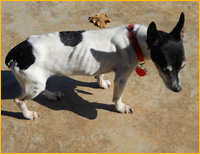 A chemical blood profile, complete blood count, and urinalysis will be conducted. While blood tests may confirm the presence of histoplasmosa antibodies, this only means that your dog has been exposed to the fungus, and not necessarily that the dog is in a diseased state as the result of exposure. Further differential testing will confirm or rule out the actual state of histoplasmosis.
A chemical blood profile, complete blood count, and urinalysis will be conducted. While blood tests may confirm the presence of histoplasmosa antibodies, this only means that your dog has been exposed to the fungus, and not necessarily that the dog is in a diseased state as the result of exposure. Further differential testing will confirm or rule out the actual state of histoplasmosis.
In order to settle on the correct course of treatment, your veterinarian will want to differentiate the symptoms of histoplasmosis from the symptoms of other diseased conditions. Severe chronic diarrhea and weight loss can indicate a variety of conditions for dogs, including lymphocytic plasmacytic enteritis, eosinophilic enteritis, lymphoma, chronic parasitism, and exocrine pancreatic insufficiency.
***
 When Sally Little Soul came into rescue at Ratbone she was a healthy, solid Rat Terrier with lots of spunk and attitude. She suddenly became ill and lethargic a few months later, and was eventually - after many tests - diagnosed with Histoplasmosis.
When Sally Little Soul came into rescue at Ratbone she was a healthy, solid Rat Terrier with lots of spunk and attitude. She suddenly became ill and lethargic a few months later, and was eventually - after many tests - diagnosed with Histoplasmosis.
A treatment plan was worked out, and she began the daily medication which might or might not save her life. Sally followed the vet's orders for over 4 months, and then submitted her "sample" for testing. The urine test came back negative; no Histoplasma capsulatum fungus was found. Sadly, she was still symptomatic, meaning that her stools are watery and quite foul.
Shortly after this Sally Little Soul went to the Bridge. The fungus had invaded her lungs, and breathing became very difficult and uncomfortable. She will be missed by her foster family and her canine foster-siblings.

When a Rattie comes into Ratbone Rescues it all starts with love and patience from our foster homes. As each Rattie grows in their foster home, there is nothing like seeing them go to their 'fur'ever home knowing that their personality will only continue to grow. It is always nice to hear about our alums and how things are going for them in their 'fur'ever homes. The Ratties just want a home to be loved in, permanently! Tinkerbell and Piper (formerly Sadie) were two Ratbone Alums who were looking for their 'fur'ever home and found it with Shanna and Gabe. Their story below is why we do what we do each day for each Rattie we save.
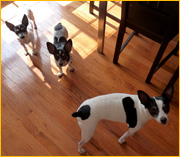 Shanna and Gabe fell in love with the Rat Terrier breed when they adopted their first Rattie, Hercules from a high-kill shelter in January 2007. Love for the Rattie breed grew and they quickly realized they wanted a friend for Hercules and of course it needed to be another Rat Terrier. They found Tinkerbell on our website and in the summer of 2007adopted their second Rattie, Tinkerbell. The dogs quickly became best friends and are inseparable to this day.
Shanna and Gabe fell in love with the Rat Terrier breed when they adopted their first Rattie, Hercules from a high-kill shelter in January 2007. Love for the Rattie breed grew and they quickly realized they wanted a friend for Hercules and of course it needed to be another Rat Terrier. They found Tinkerbell on our website and in the summer of 2007adopted their second Rattie, Tinkerbell. The dogs quickly became best friends and are inseparable to this day.
The first week Tinkerbell was at her 'fur'ever home she hid under the bed and was scared and apprehensive. With love and patience from Shanna and Gabe she finally realized this was home. Hercules was also there helping with the process of getting her to realize life is good here, as a true friend would. Now, five years later, that scared and wary Tinkerbell is a distant memory but she grew into funny, spunky girl.
 Shanna and Gabe last year decided that they had room in their hearts and home for one more Rattie. They came back to Ratbone and found Piper (formerly known as Sadie). They got to meet her before putting in their application and knew right away she was a good fit for their family. Tinkerbell and Hercules liked her also so the meeting ended in another Ratbone Rescue!
Shanna and Gabe last year decided that they had room in their hearts and home for one more Rattie. They came back to Ratbone and found Piper (formerly known as Sadie). They got to meet her before putting in their application and knew right away she was a good fit for their family. Tinkerbell and Hercules liked her also so the meeting ended in another Ratbone Rescue!
Shanna has told us this about her family.
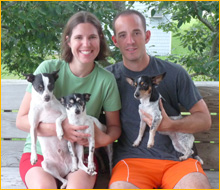 Our little family is complete. We have a dog bed in almost every room of the house, and Tinkerbell and Piper are always cuddling together in them. Hercules and Piper love to run up and down the hallway in "terrier" mode, playing together. Seeing them play together always makes us laugh! My husband is in the Air Force and deployed a lot, and when we Skype, the first thing he always says is, "Go get my dogs and hold them up to the camera." The smile on his face when he sees the dogs is priceless!
Our little family is complete. We have a dog bed in almost every room of the house, and Tinkerbell and Piper are always cuddling together in them. Hercules and Piper love to run up and down the hallway in "terrier" mode, playing together. Seeing them play together always makes us laugh! My husband is in the Air Force and deployed a lot, and when we Skype, the first thing he always says is, "Go get my dogs and hold them up to the camera." The smile on his face when he sees the dogs is priceless!
Shanna, Gabe, Tinkerbell, Hercules, and Piper
Thank you Shanna and Gabe for giving them a home of happy tails!
Best wishes from all of us at Ratbone Rescues.

Ratbone Rescues is a 501(c)(3) non-profit organization.
 For those in rescue however, spring is bittersweet, bringing with it litters of tiny, would-be pets, whose owners are unable or unwilling to find appropriate homes for them. Then there are the mamas, laden with new life, whose owners' preemptive strike is to banish them to a shelter or the streets before they bear young. The lives of these pregnant mamas, baby animals or sometimes both, often fall into the hands of rescue. Shelters are dangerous places for puppies and kittens, disease is common and for babies who are too young for vaccinations, even a short stay can be a death sentence. Many shelters won't adopt out pregnant females and keeping babies until they are old enough to be adopted is beyond the abilities of some shelters. This means that rescue provides a much needed safe haven for these little ones.
For those in rescue however, spring is bittersweet, bringing with it litters of tiny, would-be pets, whose owners are unable or unwilling to find appropriate homes for them. Then there are the mamas, laden with new life, whose owners' preemptive strike is to banish them to a shelter or the streets before they bear young. The lives of these pregnant mamas, baby animals or sometimes both, often fall into the hands of rescue. Shelters are dangerous places for puppies and kittens, disease is common and for babies who are too young for vaccinations, even a short stay can be a death sentence. Many shelters won't adopt out pregnant females and keeping babies until they are old enough to be adopted is beyond the abilities of some shelters. This means that rescue provides a much needed safe haven for these little ones. This spring has started out with a bang, our puppy numbers are in the double digits already. Our foster homes are overflowing with tiny paws and puppy breath. Sadly, our pockets are never as deep as our hearts so the big challenge for rescue is paying for the vetting all these puppies require. Every puppy needs to have a series of shots and a spay/neuter, but these are just the standard. Some will need worming, some will have more serious problems, like parvo, which can devastate a puppy as well as a bank account. The cost of treating just one puppy with parvo is likely to start at $600 and even then, there is no guarantee the puppy will recover.
This spring has started out with a bang, our puppy numbers are in the double digits already. Our foster homes are overflowing with tiny paws and puppy breath. Sadly, our pockets are never as deep as our hearts so the big challenge for rescue is paying for the vetting all these puppies require. Every puppy needs to have a series of shots and a spay/neuter, but these are just the standard. Some will need worming, some will have more serious problems, like parvo, which can devastate a puppy as well as a bank account. The cost of treating just one puppy with parvo is likely to start at $600 and even then, there is no guarantee the puppy will recover.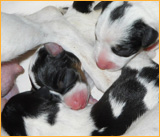 This is why most rescues, including Ratbone Rescues, spend so much time on fund-raising, looking for grants and seeking donations. Despite those effort, more often than not we are barely making ends meet. Plush bank accounts are pretty much non-existent among rescues. Although we really hate that we seem to always have our hand out, the truth is, we do. Unfortunately, if we are to acontinue rescuing Rat Terriers we have little choice but to rely on the generosity of our supporters to help us meet the expenses of saving these little darlings. In case we don't say it often enough, "THANK YOU!"
This is why most rescues, including Ratbone Rescues, spend so much time on fund-raising, looking for grants and seeking donations. Despite those effort, more often than not we are barely making ends meet. Plush bank accounts are pretty much non-existent among rescues. Although we really hate that we seem to always have our hand out, the truth is, we do. Unfortunately, if we are to acontinue rescuing Rat Terriers we have little choice but to rely on the generosity of our supporters to help us meet the expenses of saving these little darlings. In case we don't say it often enough, "THANK YOU!"





